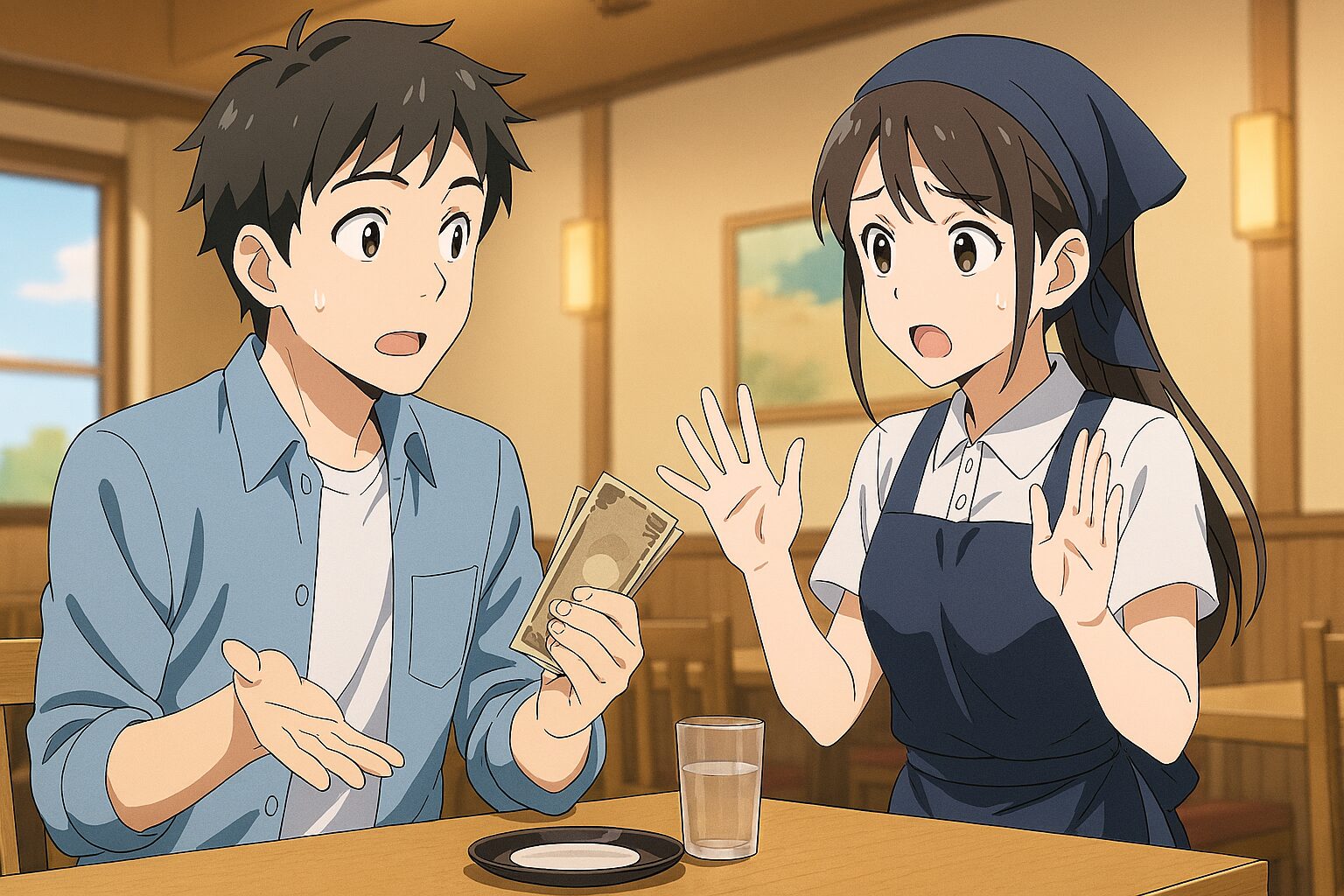- Understanding the Spirit of Omotenashi for International Visitors
- 🌏 What Is Tipping Culture?
- 🇯🇵 Why Is Tipping Not Expected in Japan?
- 🏯 Did Japan Ever Have a Tipping Culture?
- 💡 Can Tipping Be Considered Rude?
- ✨ How to Show Appreciation Without Tipping
- 🌐 Countries Where Tipping Is Also Uncommon
- ✈️ Tips for International Visitors
- 📝 Conclusion: Gratitude Without Money
- 海外の読者に伝えたい「おもてなし」の文化と背景
- 🌏 チップ文化とは何か?
- 🇯🇵 日本ではなぜチップが不要なのか?
- 🏯 歴史的にはチップ文化があった?
- 💡 チップを渡すと逆に失礼になることも?
- ✨ 感謝の気持ちはどう伝える?
- 🌐 日本以外にもチップ不要な国はある?
- ✈️ 海外の方へのアドバイス
- 📝 まとめ:チップがなくても心は伝わる
Understanding the Spirit of Omotenashi for International Visitors
When traveling abroad, many people wonder whether they should leave a tip after dining or staying at a hotel. In countries like the United States or France, tipping is a deeply rooted custom. But in Japan, tipping is virtually nonexistent.
This article explores why tipping is not expected in Japan, through cultural values, historical background, and the modern service system. It’s a guide for international visitors to better understand and enjoy their time in Japan without confusion.
🌏 What Is Tipping Culture?
A tip is an additional payment given to express gratitude for a service. In English, it’s also called a “gratuity.” Some say the word “tip” originated from “To Insure Promptness.”
In the U.S., for example, it’s common to tip 15–20% at restaurants, and a few dollars to hotel staff or taxi drivers.
🇯🇵 Why Is Tipping Not Expected in Japan?
1. Service Charges Are Already Included
In Japan, many upscale restaurants and hotels include a service charge in the bill. It’s clearly stated on the receipt, so there’s no need to tip additionally.
Reference: Biteki Seikatsu article
2. Wages Are Not Tip-Based
In many Western countries, service workers rely on tips to supplement low base wages. In Japan, wages are set without assuming tips, so employees can earn a stable income regardless of gratuities.
3. The Spirit of Omotenashi
Japanese service culture is built on the idea that “the customer is god.” Providing excellent service is a matter of pride, not a transaction. Gratitude is expressed through hospitality, not money.
Reference: Living in JAPAN
🏯 Did Japan Ever Have a Tipping Culture?
Historically, Japan had a custom called “kokorozuke,” similar to tipping. Guests at traditional inns (ryokan) would give a small envelope with cash to express appreciation for special treatment.
However, as Japan modernized and standardized service quality, this practice faded. Today, consistent service is expected for all customers, regardless of payment.
💡 Can Tipping Be Considered Rude?
In Japan, offering a tip may be politely declined. In some cases, staff may even chase after you to return the money. This is because tipping can imply a hierarchical relationship, which may feel uncomfortable or inappropriate in Japanese culture.
✨ How to Show Appreciation Without Tipping
- Say “thank you” with a smile
- Leave positive feedback on surveys
- Post compliments on social media
- Write a thank-you note or card
These gestures are often more meaningful than money in Japan.
🌐 Countries Where Tipping Is Also Uncommon
| Country | Tipping Practice |
|---|---|
| Argentina | Tipping is illegal by law |
| France | Service charge is mandatory and included |
| Oman | Tipping may be considered rude |
| South Korea & China | Generally not expected |
| Sweden | Tipping culture is minimal |
Reference: Biteki Seikatsu tipping comparison chart
✈️ Tips for International Visitors
- No tipping is required in Japan
- Express gratitude through words and gestures
- “Kokorozuke” may be appropriate in rare, traditional settings
📝 Conclusion: Gratitude Without Money
In Japan, appreciation is expressed through hospitality and respect—not through tipping. This reflects a deeper cultural value of trust and mutual respect.
When visiting Japan, a sincere “thank you” is often the most powerful gesture you can offer. It’s the true spirit of omotenashi.
日本ではなぜチップが不要なのか?海外の読者に伝えたい「おもてなし」の文化
日本ではなぜチップが不要なのか?
海外の読者に伝えたい「おもてなし」の文化と背景
海外旅行でレストランやホテルを利用すると、会計時に「チップを渡すべきか?」と悩むことがあります。アメリカやフランスなどでは、チップはサービスへの感謝を示す重要な習慣です。しかし、日本ではこの「チップ文化」がほとんど存在しません。
この記事では、「なぜ日本ではチップが不要なのか?」という疑問に対して、歴史的背景、文化的価値観、そして現代のサービス体系から丁寧に解説します。
🌏 チップ文化とは何か?
チップ(Tip)とは、サービスを受けた際に、その感謝の気持ちとして追加で支払うお金のことです。英語では「gratuity」とも呼ばれます。
例えばアメリカでは、レストランでの食事代に加えて15〜20%のチップを支払うのが一般的です。
🇯🇵 日本ではなぜチップが不要なのか?
1. サービス料が料金に含まれている
日本の高級ホテルやレストランでは、すでに「サービス料」が代金に含まれていることが多く、レシートにも明記されています。
参考:美的生活の記事
2. 給与体系がチップ前提ではない
欧米では、サービス業の最低賃金が低く設定されており、チップが収入の一部として期待されています。一方、日本では、従業員の給与はチップを前提とせずに設定されています。
3. 「おもてなし」の精神
日本のサービス業では、「お客様は神様」という考え方が根付いています。金銭的報酬ではなく、相手の満足や感謝を得ることに価値を置く文化です。
🏯 歴史的にはチップ文化があった?
明治〜昭和初期の日本では「心づけ」と呼ばれるチップのような習慣が存在していました。旅館で特別な配慮を受けた際に、封筒に入れた現金を渡すという形式です。
💡 チップを渡すと逆に失礼になることも?
日本では、チップを渡そうとすると「お気持ちだけで十分です」と断られることがあります。場合によっては、従業員が追いかけてきて返してくることもあります。
✨ 感謝の気持ちはどう伝える?
- 「ありがとうございました」と笑顔で伝える
- アンケートに好意的なコメントを書く
- SNSで店舗やスタッフを褒める投稿をする
- 手紙やメッセージカードを残す
🌐 日本以外にもチップ不要な国はある?
| 国名 | チップの状況 |
|---|---|
| アルゼンチン | 法律でチップが違法 |
| フランス | サービス料込みの料金が義務 |
| オマーン | チップを渡すと失礼になることも |
| 韓国・中国 | 一般的には不要 |
| スウェーデン | チップ文化はほぼ存在しない |
✈️ 海外の方へのアドバイス
- 基本的にチップは不要
- サービス料は料金に含まれていることが多い
- 感謝は言葉や態度で伝える
- 心づけは特別な状況でのみ渡す(例:旅館での特別対応)
📝 まとめ:チップがなくても心は伝わる
日本では、チップという形ではなく、「おもてなし」や「感謝の言葉」で心を通わせる文化が根付いています。これは、金銭的なやり取りを超えた、人と人との信頼関係を大切にする価値観です。
ぜひ、日本を訪れた際には、チップの代わりに「ありがとう」の一言を添えてみてください。それが何よりの「心づけ」になるはずです。



コメント